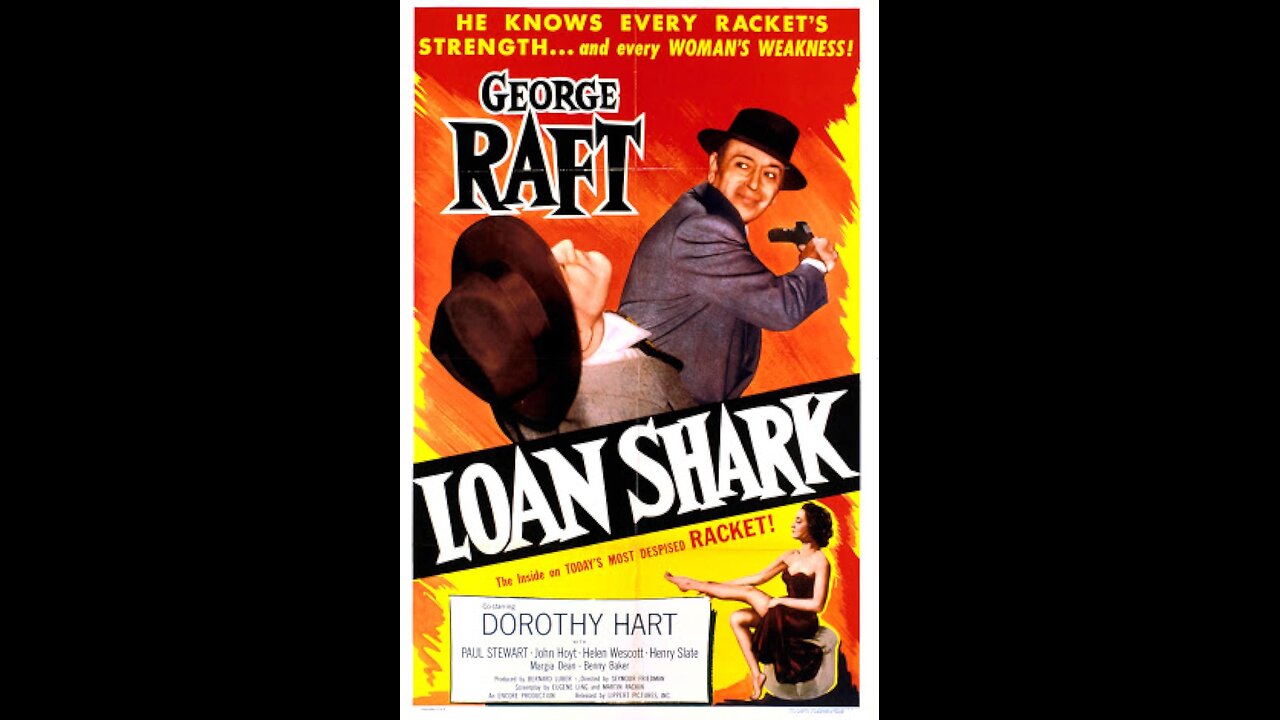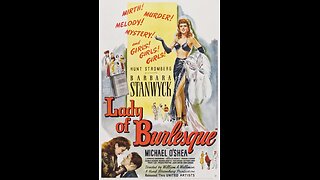Premium Only Content

Loan Shark (1952) | Directed by Seymour Friedman
"Loan Shark" (1952) is a gritty crime drama directed by Seymour Friedman and starring George Raft, a well-known tough-guy actor, in the lead role. The film is set in the shadowy world of illegal loan sharking and explores themes of crime, vengeance, and redemption. George Raft stars as Joe Gargen, an ex-convict who is reluctantly pulled back into the criminal underworld to seek justice after his brother-in-law is murdered by a loan shark syndicate.
Joe, trying to live a straight life after his release from prison, is thrust back into action when his sister's husband is killed after getting entangled with dangerous loan sharks. As Joe infiltrates the organization responsible for his brother-in-law’s death, he finds himself walking a dangerous line between law enforcement and the criminal world. He poses as a laborer at a factory targeted by loan sharks, gathering information to bring the syndicate down from the inside.
With the help of Ann Nelson (Dorothy Hart), a worker at the factory who gets involved in the plot, Joe begins to unravel the intricate network of loan sharks led by the cunning Lou Donelli (Paul Stewart). However, as Joe gets deeper into the world he had left behind, he must confront his own demons and the question of whether he can truly escape his past.
"Loan Shark" combines hard-hitting action with a strong noir atmosphere, featuring shadowy cinematography and tense sequences. It’s a revenge-driven narrative where the protagonist’s moral ambiguity plays a central role, making it a quintessential film noir of the early 1950s.
"Loan Shark" is a representative entry in the film noir genre of the early 1950s, driven largely by George Raft’s commanding screen presence and the film’s exploration of criminal elements lurking beneath the surface of everyday life. Raft, known for his tough-guy roles in films like Scarface and They Drive by Night, brings a steely resolve and depth to the character of Joe Gargen. His performance is nuanced, as he navigates the fine line between justice and revenge, giving the film a dark, morally complex center.
Dorothy Hart provides strong support as Ann Nelson, the film's leading lady, who becomes entangled in Joe’s dangerous mission. Her character is well-rounded, offering both romantic interest and emotional depth to the otherwise gritty narrative. Paul Stewart, as the menacing Lou Donelli, is suitably villainous, portraying the loan shark syndicate leader with cold, calculating ruthlessness that adds to the tension and danger of the plot.
The film’s direction by Seymour Friedman is taut and efficient, focusing on creating suspense through sharp dialogue and tense confrontations rather than relying on excessive action sequences. Friedman’s workmanlike approach, along with Harry Neumann’s cinematography, captures the claustrophobic, shadowy environments that define the noir aesthetic. Factories, alleyways, and seedy offices create an atmosphere where danger lurks around every corner, reinforcing the theme of inescapable fate that runs throughout the film.
The pacing of "Loan Shark" is generally tight, although there are moments where the plot takes predictable turns. However, the strong performances and the film’s ability to maintain a sense of tension and moral ambiguity make it an effective crime drama. It is a solid example of post-war noir, where the trauma of the past and the uncertainty of the future are reflected in the characters’ lives.
At the time of its release, "Loan Shark" received mixed to positive reviews. George Raft’s performance was generally praised, with critics acknowledging that he brought his usual tough-guy charm to the role. Many reviewers appreciated the film’s dark, atmospheric portrayal of the loan shark business, a topic that was rarely explored in films of the era. Paul Stewart, in particular, garnered attention for his role as the villain, with critics noting his ability to convey menace with a calm, understated performance.
However, some criticism was directed toward the film’s formulaic plot. The narrative, while engaging, was seen as typical for crime dramas of the time, following predictable patterns of revenge and redemption. Despite this, the film’s strong noir elements, effective pacing, and performances helped elevate it beyond a standard crime story.
"Loan Shark" wasn’t a major box office success, but it found its place among fans of noir and crime films. Its exploration of themes such as the corrupting nature of crime and the difficulty of escaping one’s past resonated with audiences of the time, particularly in the post-World War II context.
Legacy:
While "Loan Shark" may not be one of the most iconic film noirs, it holds its own as a solid example of the genre. The film has since become a staple for fans of George Raft, who delivered one of his more memorable performances in the later stage of his career. It also remains noteworthy for its depiction of the illegal loan shark industry, a rarely tackled subject in classic Hollywood films.
The film’s gritty realism, combined with its moral complexity, makes it a valuable addition to the canon of 1950s noir. For modern viewers, "Loan Shark" offers a glimpse into the concerns of postwar America, particularly regarding crime and corruption. It stands as a reminder of the pervasive influence of noir on American cinema, and for those interested in crime thrillers of the era, it is an entertaining and suspenseful film that still holds relevance today.
Full Cast:
George Raft as Joe Gargen
Dorothy Hart as Ann Nelson
Paul Stewart as Lou Donelli
John Hoyt as Vince Phillips
Helen Westcott as Martha Gargen
Russell Johnson as Charlie Thompson
Henry Slate as Paul Nelson
Margia Dean as Mae
George Selk as Pop
-
 1:29:52
1:29:52
Classic Films & Movies Archive
2 days agoThe Lady of Burlesque (1943) | Directed by William A. Wellman
881 -
 LIVE
LIVE
FusedAegisTV
13 hours agoMario Galaxy, Batman, Real Talk/Politics, & MORE - V-Day 💗 Friday Variety Stream!
152 watching -
 1:10:49
1:10:49
Vigilant News Network
2 hours agoRFK Jr. Drops a Stunning Announcement | The Daily Dose
14.9K3 -
 49:49
49:49
Candace Show Podcast
5 hours agoEXCLUSIVE: Blake & Ryan’s Desperate Legal Strategy Exposed! | Candace Ep 147
115K71 -
 1:32:20
1:32:20
2 MIKES LIVE
3 hours ago2 MIKES LIVE #180 with guest Kyle Rittenhouse!
12.3K -
 9:40
9:40
Tactical Advisor
8 hours agoBest Home Defense Shotgun Build | Genesis Gen 12
13.2K -
 56:44
56:44
VSiNLive
5 hours ago $2.84 earnedFollow the Money with Mitch Moss & Pauly Howard | Hour 1
45.4K1 -
 1:05:48
1:05:48
The Amber May Show
8 hours ago $1.66 earnedBig Balls | You Know It's Bad When Legacy Media Reports On Big Balls | Sam Anthony
21.1K5 -
 LIVE
LIVE
SoniCentric
1 day agoEnjoy a COZY Valentine's Day Escape to Paris with the BEST blend of Romantic Music
100 watching -
 1:59:52
1:59:52
Revenge of the Cis
6 hours agoEpisode 1447: Love Train
51.2K6